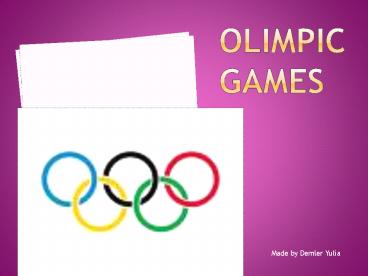Olimpic Games - PowerPoint PPT Presentation
1 / 16
Title:
Olimpic Games
Description:
Made by Demler Yulia The Olympic Games are an international event of summer and winter sports, in which thousands of athletes compete in a wide variety of events. – PowerPoint PPT presentation
Number of Views:230
Avg rating:3.0/5.0
Title: Olimpic Games
1
Olimpic Games
- Made by Demler Yulia
2
The Olympic Games are an international event of
summer and winter sports, in which thousands of
athletes compete in a wide variety of events. The
Games are currently held every two years, with
Summer and Winter Olympic Games alternating.
Originally, the ancient Olympic Games were held
in Olympia, Greece, from the 8th century BC to
the 5th century AD. In the late 19th century,
Baron Pierre de Coubertin was inspired by Olympic
festivals to revive the Games. For this purpose,
he founded the International Olympic Committee
(IOC) in 1894, and two years later, the modern
Olympic Games were established in Athens. The IOC
has since become the governing body of the
Olympic Movement, whose structure and actions are
defined by the Olympic Charter.
3
Ancient Olympics
4
The origin of the Ancient Olympics is shrouded in
mystery and legend. One of the most popular myths
identifies Heracles and his father Zeus as the
progenitors of the Games. According to legend, it
was Heracles who first called the Games "Olympic"
and established the custom of holding them every
four years. A legend persists that after Heracles
completed his twelve labors, he built the Olympic
stadium as an honor to Zeus. Following its
completion, he walked in a straight line for 200
steps and called this distance a "stadion"
(Greek st?d???, Latin stadium, "stage"), which
later became a unit of distance.
5
Modern Games
6
The first significant attempt to emulate the
ancient Olympic Games was the L'Olympiade de la
République, a national Olympic festival held
annually from 1796 to 1798 in Revolutionary
France. The competition included several
disciplines from the ancient Greek Olympics. The
1796 Games also marked the introduction of the
metric system into sport. In 1850 an Olympian
Class began at Much Wenlock, in Shropshire,
England. It was renamed the Wenlock Olympian
Games in 1859, and continues today as the Wenlock
Olympian Society Annual Games. In 1866, a
national Olympic Games in Great Britain was
organized by Dr. William Penny Brookes at
London's Crystal Palace
7
(No Transcript)
8
Greek interest in reviving the Olympic Games
began after the country's independence from the
Ottoman Empire in 1829. It was first proposed by
poet and newspaper editor Panagiotis Soutsos in
his poem "Dialogue of the Dead", published in
1833. Evangelis Zappas, a wealthy Greek
philanthropist, sponsored the first modern
international Olympic Games in 1859 in an Athens
city square. Athletes came from Greece and the
Ottoman Empire. Later Zappas paid for the
complete restoration of the ruins of the ancient
Panathenian Stadium so that it could stage two
further editions of the Games, one in 1870 and a
second in 1875
9
1896 Games
10
There were fewer than 250 athletes at the first
Olympic Games of the modern times. The
Panathenian Stadium, restored for Zappas's Games
of 1870 and 1875, was refurbished a second time
in preparation for this inaugural edition in
1896.These Olympics featured nine sporting
disciplines athletics, cycling, fencing,
gymnastics, shooting, swimming, tennis,
weightlifting, and wrestling rowing events were
scheduled for competition but had to be cancelled
due to bad weather conditions. The Greek
officials and public were enthusiastic about the
experience of hosting the inaugural Games. This
feeling was shared by many of the athletes, who
even demanded that Athens be the host of the
Olympic Games on a permanent basis. The IOC had,
however, envisaged these modern Olympics to be an
itinerating and truly global event. As such they
decided to hold the second Games in Paris.
11
Winter Games
- The Winter Olympics were created to feature snow
and ice sports that were logistically impossible
to hold during the Summer Games. Figure skating
(in 1908 and 1920) and ice hockey (in 1920) were
featured as Olympic events at the Summer
Olympics. The IOC desired to expand this list of
sports to encompass other winter activities
12
Youth Games
13
Starting in 2010, the Olympic Games will be
complemented by Youth Games, where athletes
between the ages of 14 and 18 will compete. The
first Summer Youth Games will be in Singapore in
2010, while the inaugural Winter Games will be
hosted in Innsbruck, Austria, two years
later.These Games will be shorter than the senior
Games the summer version will last twelve days,
while the winter version will last nine days. The
IOC will allow 3,500 athletes and 875 officials
to participate at the Summer Youth Games, and 970
athletes and 580 officials at the Winter Youth
Games. The sports to be contested will coincide
with those scheduled for the traditional senior
Games, however there will be a reduced number of
disciplines and events
14
International Olympic Committee
- The Olympic Movement encompasses a large number
of national and international sporting
organizations and federations, recognized media
partners, as well as athletes, officials, judges,
and every other person and institution that
agrees to abide by the rules of the Olympic
Charter.
15
Symbols and ceremonies
16
Symbols
- The Olympic Movement uses symbols to represent
the ideals embodied in the Olympic Charter. The
Olympic symbol, better known as the Olympic
rings, consists of five intertwined rings and
represents the unity of the five inhabited
continents































